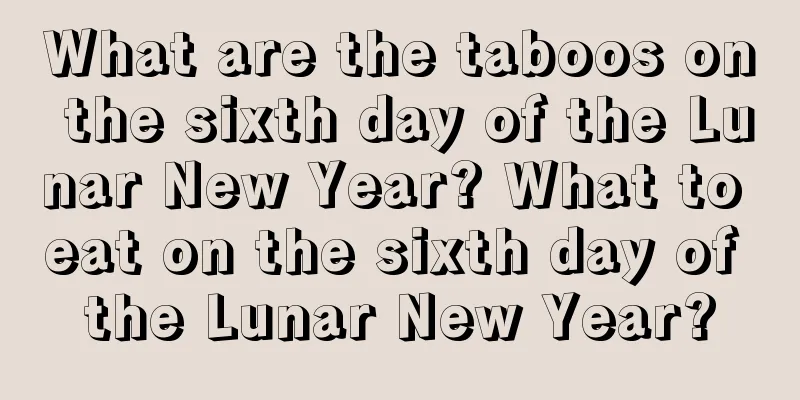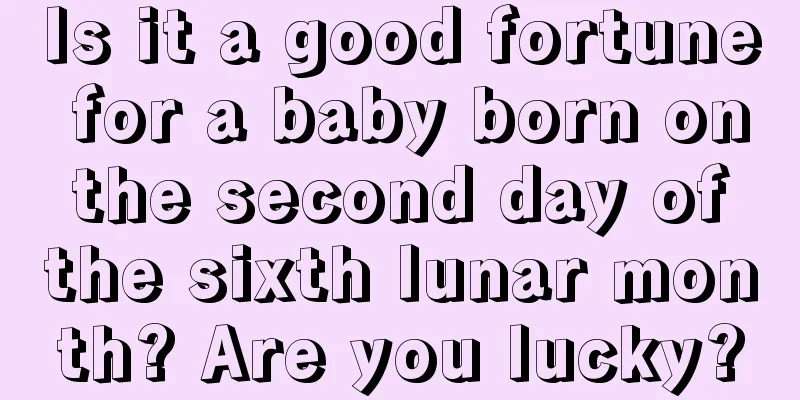What are the traditional customs of the Dragon Boat Festival? The most complete Dragon Boat Festival customs and activities 2020 edition

Introduction: The Dragon Boat Festival is one of the important traditional festivals. There are also many customs and activities related to the Dragon Boat Festival. So what are the traditional customs of the Dragon Boat Festival? The most complete Dragon Boat Festival customs and activities collection 2020 edition! The fifth day of the fifth month of the lunar calendar is the Dragon Boat Festival, so the fifth month of the lunar calendar is also called Duanyue. Shuimoxiansheng.com has prepared for you the auspicious and inauspicious days in May of the lunar calendar in 2020. Come and have a look.What are the traditional customs of the Dragon Boat Festival? The most complete collection of Dragon Boat Festival customs and activities in 2020!The most comprehensive analysis of Dragon Boat Festival customs: Dragon Boat RacingDragon boat racing is an important activity of the Dragon Boat Festival. It is an ancient ritual of worshiping the dragon totem and a legacy of custom. According to the "First Excavation Report of Hemudu Site", as early as 7,000 years ago, ancient ancestors had carved canoes out of single logs and added wooden oars for rowing. The dragon boat was originally a canoe made of a single piece of wood with a dragon shape carved on it. Later it developed into a dragon-shaped boat made of wooden boards. The most comprehensive analysis of Dragon Boat Festival customs: hanging mugwort and calamus The tradition of arranging various flowers and plants to ward off evil spirits and cure diseases during the Dragon Boat Festival is also very old. People regard inserting mugwort and calamus as an important part of the Dragon Boat Festival. For example, hanging mugwort on the door. "Jingchu Sui Shi Ji" records: "Pick mugwort and make human figures, hang them on the door to ward off poisonous gas." This is because mugwort is an important medicinal plant, which can be made into moxa to treat diseases, used for moxibustion, and to repel insects. In May, the mugwort contains the most mugwort oil (this is the peak period of cultural growth), so it is most effective, and people rush to pick mugwort. People often hang a few mugwort plants at their doorsteps. Due to its special fragrance, people use it to drive away diseases, prevent mosquitoes, and ward off evil spirits. The most complete analysis of Dragon Boat Festival customs: eating zongzi during Dragon Boat Festival Eating rice dumplings during the Dragon Boat Festival is a traditional custom of the Chinese nation since ancient times. Zongzi, also known as "zongzang", is commonly known as "zongzi" and is a type of "zang". "Zheng" is an offering used to worship gods and ancestors during festivals. There are many varieties of Zheng, and different Zheng are made for different festivals. Making Zheng to worship gods and ancestors is an ancient custom. The main ingredients of zongzi are rice, fillings and bamboo leaves (or hollyhock leaves), and there are many varieties of them. Due to different eating habits in different places, rice dumplings have formed northern and southern flavors; in terms of taste, there are two types of rice dumplings: salty and sweet. The custom of eating rice dumplings during the Dragon Boat Festival has been popular in China for thousands of years. It has become one of the most influential and widespread folk food customs of the Chinese nation, and has spread to Korea, Japan and Southeast Asian countries. The most comprehensive analysis of Dragon Boat Festival customs: flying kites A kite is a flying device that uses only aerodynamics and is made by pasting paper or silk on a bamboo frame and then flying into the sky by pulling a long string tied to the string. In southern China, children flying kites on the Dragon Boat Festival is called "releasing disasters." The most complete analysis of Dragon Boat Festival customs: washing with herbal water Herbal water is the Mulan Soup recorded in ancient books. Washing with herbal water on the Dragon Boat Festival can cure skin diseases and remove evil spirits. The Dragon Boat Festival is the day in the year when the medicinal properties of plants are the strongest, and medicines are everywhere on this day. During the Dragon Boat Festival, many places in my country have the custom of collecting herbs and boiling herbal water for bathing. The medicinal properties of Dragon Boat Festival herbs play a vital role in this. The most comprehensive analysis of Dragon Boat Festival customs: tying five-colored silk threads In traditional Chinese culture, the five colors of "blue, red, white, black and yellow" that symbolize the five directions and five elements are regarded as auspicious colors. Tying five-colored silk threads on arms was once a popular custom during the Dragon Boat Festival. It was passed down to later generations and developed into many kinds of beautiful ornaments such as longevity threads, longevity locks, sachets, etc. The production volume also became more and more refined, becoming a unique folk art of the Dragon Boat Festival. The most comprehensive analysis of Dragon Boat Festival customs: Watering at noon Noon water refers to the water drawn from the well at noon on the Dragon Boat Festival. "Drawing water at noon" during the Dragon Boat Festival is a traditional custom prevalent in the coastal areas of southern China. At noon on the Double Fifth Day, yang is added to yang, so "noon water" is known as "extreme yang water", "dragon eye water" and "positive yang water". The ancients regarded the water fetched at noon as auspicious water. The Yang energy is at its strongest at noon on this day, and noon on the Dragon Boat Festival is the best time to exorcise evil spirits. It has the effect of warding off evil spirits, cleansing the body, and removing obstacles. It is said that the water used to make tea and wine at noon is particularly fragrant, and drinking it raw can even have miraculous effects in curing diseases. There is a proverb that goes, "Wash your eyes at noon, and they will be as bright as a black eagle." Another saying goes, "Drink a mouthful of water at noon, and you will be able to take tonic medicine for three years." The most comprehensive analysis of Dragon Boat Festival customs: Casting Yangsui Wang Chong of the Eastern Han Dynasty recorded the ritual custom of "casting Yangsui" on the Dragon Boat Festival in "Lunheng": "Yangsui is taken from the sky at noon on the Bingwu day of May. Five kinds of stones are melted and cast into a vessel. When it is rubbed to produce light, it is faced towards the sun, and fire will come. This is the way to get real fire." The ancients believed that the noon hour in the noon month and noon day was the time when the Yang energy was at its peak. At this moment, fire could overcome gold, and it was the best time to melt gold and cast a bronze mirror. The cast bronze mirror had incredible magical powers. The custom of using mirrors to ward off evil spirits is widely used and inherited in the coastal areas of the south. It is common to see newborn babies wearing silver mirrors and other ornaments. These small silver mirrors are used to ward off evil spirits for children. Newly built temples and Taoist temples are often decorated with bronze mirrors in the center of their roofs. Even above the doors and windows of new buildings in modern communities, you can often find mirrors hanging. These are used to ward off evil spirits. This shows that the cultural belief that mirrors can ward off evil spirits is deeply rooted among the people. The most comprehensive analysis of Dragon Boat Festival customs: Dipping dragon boats in water People call the heavy rainfall around the Dragon Boat Festival dragon boat water, Duanyang water, dragon water, dragon rainfall water, etc. They believe that this water is auspicious water that can ward off evil spirits. During the Dragon Boat Festival in midsummer, the blue dragon and the stars rise to the south sky. In folk beliefs, the dragon is a symbol of good luck and the master of weather and rain. The dragon flies into the sky and brings clouds and rain. In terms of natural phenomena, around the Dragon Boat Festival every year, warm and humid air currents are active in southern my country, meeting with cold air moving south from the north in Guangdong, Guangxi, Fujian and Hainan, often resulting in continuous and large-scale heavy rainfall. When heavy rainfall comes during the Dragon Boat Festival, water levels in rivers rise rapidly, providing good conditions for dragon boat racing. Soaking in dragon boat water is a traditional custom popular in southern China. Because dragon boat water symbolizes good luck, people believe that dragon boat water and the water through which the dragon boat passes are "lucky water". According to tradition, soaking in dragon boat water symbolizes good luck and everything goes well. The most comprehensive analysis of Dragon Boat Festival customs: Wearing bean-shaped ornaments This was the headdress worn by women during the Dragon Boat Festival in the old days, and was mostly seen in the south of the Yangtze River. In some areas, they are also called Jianren. Some say this object originated from the ancient buyao, while others say it is a different form of mugwort man. The Qing Jia Lu quoted the Tang and Song Yi Ji as saying: "Whether north or south of the Yangtze River, the five-day hairpins are made with great ingenuity. ... They are decorated with banners, canopies, embroidered balls, tassels, and bells of various shapes, or strung together, called bean maidens, and are innumerable." The most comprehensive analysis of Dragon Boat Festival customs: sticking noon talismans In the old days, there was a custom of posting "noon talismans" in some places in Guangdong. After lunch, every family puts up a "noon talisman". The talisman is made of a strip of yellow paper about an inch wide and nearly a foot long, on which is written in cinnabar the words "Write at noon on May 5th, and all legal troubles, verbal disputes, diseases, snakes, insects, rats and ants will be eliminated." Hang calamus, phoenix tail, mugwort, etc. on the door, and tie a bunch of garlic and apply cinnabar to ward off evil spirits. Some families also put a small couplet written on yellow paper on their doors: "The mugwort flag welcomes a hundred blessings, and the cattail sword cuts off a thousand evils." The most comprehensive analysis of Dragon Boat Festival customs: worshipping gods and ancestors Worshiping gods and ancestors is one of the important customs of the Dragon Boat Festival. "Heaven and earth are the basis of life; ancestors are the basis of mankind." Heaven and earth are the basis of life, and ancestors are the basis of mankind. Ancestor worship is a custom that passes on filial piety, and through sacrifice, we pray and repay their protection and blessings. During the Dragon Boat Festival, there is a custom of smearing realgar on children's foreheads, which is said to ward off poisonous insects. The typical method is to use realgar wine to draw the word "王" on the child's forehead. One is to use realgar to drive away poison, and the other is to use the tiger ("王" resembles the forehead pattern of a tiger, and the tiger is the king of beasts, so it is used to represent the tiger) to suppress evil. In addition to applying on the forehead, nose and ears, you can also apply it to other parts of your body, with the same purpose. The "Hequ County Chronicle" of Shanxi Province states: "During the Dragon Boat Festival, people drink realgar wine and apply it on children's foreheads, hands, and soles of feet. It is said that it can cure diseases and prolong life." The most comprehensive analysis of Dragon Boat Festival customs: Fumigation of Atractylodes Fumigation with Atractylodes lancea is one of the traditional customs of the Dragon Boat Festival. In folk culture, Atractylodes lancea is used to disinfect the air. Natural Atractylodes lancea are tied together and the thin smoke produced after burning not only emits a pleasant fragrance, but also drives away mosquitoes, making people feel refreshed. The most comprehensive analysis of Dragon Boat Festival customs: hiding from the Dragon Boat Festival Hiding from the Dragon Boat Festival, referred to as "Hiding from the Wu" or "Hiding from the Duanwu", is a local custom that was popular in northern my country during the Dragon Boat Festival. In ancient times, people in the north regarded May and May 5th as unlucky months and days, and many things had to be avoided, especially the custom of bringing girls home to avoid the Dragon Boat Festival. The "Jiajing and Longqing Chronicles" also records: "Married girls were called back to celebrate the festival." Also, "Luanzhou Chronicles" records: "Newly married women are welcomed back home in this month, which is called 'hiding from the Dragon Boat Festival'." The most comprehensive analysis of Dragon Boat Festival customs: Avoid the five poisonous creatures In the minds of ancient northerners, the Dragon Boat Festival was a poisonous and evil day. This idea has been passed down among the people, which is why there are various customs of praying for peace and avoiding the five poisons. In fact, this is because the weather in the north is hot and dry in summer, people are prone to illness and plagues are easy to spread; plus snakes and insects multiply and are easy to bite people, which forms this habit. People believe that May is the time when the five poisonous creatures (scorpions, snakes, centipedes, geckos, and toads) appear, and that various methods should be used to prevent the harm caused by the five poisonous creatures. Generally, a picture of the five poisonous creatures is posted in the house. Five poisonous creatures are printed on red paper, and then five needles are pricked on the five poisonous creatures. It is believed that the poisonous creatures are stabbed to death and cannot run rampant anymore. People also embroider the five poisonous creatures on their clothes and decorate cakes with patterns of the five poisonous creatures, both of which are meant to drive away evil spirits. The most comprehensive analysis of Dragon Boat Festival customs: collecting herbs and making herbal tea Collecting herbs is one of the oldest Dragon Boat Festival customs. According to folk customs, the Dragon Boat Festival is a day of strong yang energy, and it is the day when plants have the strongest medicinal properties in the year, and medicines are everywhere on the Dragon Boat Festival. The custom of picking herbs is formed around the Dragon Boat Festival because the stems and leaves of herbs are ripe and have good medicinal properties. The custom of collecting herbs and arranging various flowers and plants that can ward off evil spirits during the Dragon Boat Festival has a long history. This custom had a wide influence during the Han Dynasty, and later gradually affected various countries in East Asia. Xia Xiaozheng, a book in the Book of Rites of Dai Da at the end of the Western Han Dynasty, states: "On this day, medicine is stored to eliminate poisonous gases." Volume 22 of Sui Shi Guang Ji, "Collecting Various Medicines," quotes a lost text from Jingchu Sui Shi Ji: "On May 5th, people compete to collect various medicines, which can cure all kinds of diseases." The Chinese people still generally believe that the medicines collected during the Dragon Boat Festival are the most effective. The principle supporting this kind of folk belief is naturally based on a cosmological explanation: on the Dragon Boat Festival or at noon on this day, the yang energy is at its peak due to seasonal changes, but it is also the time when various herbs grow most luxuriantly. Therefore, the herbs picked on this day are the most efficacious and effective. The most comprehensive analysis of Dragon Boat Festival customs: drinking cattail wine, realgar wine, and cinnabar wine Drink Pu wine, realgar wine, and cinnabar wine, and spray with the wine. "Jingchu Sui Shi Ji" says: "Use calamus, either carved or shaved, and cold wine." Pu wine has a fragrant and refreshing taste. Later, realgar, cinnabar, etc. were added to the wine. "Yueling Guangyi" by Feng Yingjing of the Ming Dynasty wrote: "On the fifth day, use cinnabar wine to ward off evil spirits and detoxify. Use the wine to stain your forehead, chest, hands and soles of your feet to avoid the trouble of vipers (a kind of poisonous snake mentioned in ancient books). Also sprinkle the walls, doors and windows with the wine to avoid poisonous insects." This custom is quite widespread. The medicinal ingredients include realgar, calamus, cypress seeds, peach kernels, cattail leaves, mugwort, etc. People soak them in wine and then sprinkle them on the corners of walls, doors and windows, under the bed, etc., and then use wine to apply to children's ears, noses, and navels to drive away poisonous insects. From a health perspective, these activities make scientific sense. Realgar, water and wine can be added to the realgar and sprinkled indoors to disinfect and kill bacteria. Drinking cattail spray is also quite beneficial. The most comprehensive analysis of Dragon Boat Festival customs: Dragon Boat Festival Rain In the south, it is called Dragon Boat Water or Duanyang Water when it rains during the Dragon Boat Festival. Washing with Dragon Boat Water can remove bad luck and bring good luck. In the north, it is believed that no rain on the Dragon Boat Festival means a good harvest, while rain on the Dragon Boat Festival means that ghosts are prosperous and people will suffer disasters; on May 5th, people dry medicine in the sun and there will be no disasters; if it rains, ghosts dry medicine in the sun and people will get sick. This belief has existed for a long time. Chen Yuanliang's Sui Shi Guang Ji quoted the "Ti Yao Lu" and said: "On May 5th, people dry medicine in the sun and there will be no disasters. If it rains, ghosts dry medicine in the sun and people will get sick." Xu Yueqing's note to "Ci Yun Shu Ren Li Shizhou Fu Dragon Boat Festival" said: "People in Linchuan say that rain on the Dragon Boat Festival means that ghosts are prosperous and people will suffer disasters; Zhao Huaiyu of the Qing Dynasty also quoted the proverb "No rain on the Dragon Boat Festival means a good harvest" in his poem note. The most comprehensive analysis of Dragon Boat Festival customs: Zhong Kui dance Dancing Zhong Kui: a folk dance, also known as "Playing Zhong Kui". It is reported that the Zhong Kui dance originated in the Northern Song Dynasty and is a traditional folk performance preserved from ancient Huizhou. It includes various contents such as "Going on Tour", "Marrying a Sister" and "Eliminating the Five Poisons", etc., which reflects the people's admiration for Zhong Kui's uprightness and their good wishes for eliminating evil and bringing blessings. In folk culture, "Zhong Kui" is a symbol of warding off evil and upholding righteousness. Dancing Zhong Kui during the Dragon Boat Festival symbolizes the elimination of the five poisons, peace throughout the four seasons, and longevity and good harvests. During the Qing Dynasty, residents in Jiangsu and Zhejiang areas of the south of the Yangtze River would hang pictures of Zhong Kui on their doors or in their halls for a month in the fifth month of the lunar calendar, in the hope of warding off evil spirits, eliminating harm, and bringing in good fortune. The most comprehensive analysis of Dragon Boat Festival customs: fighting grass Fighting on grass is a folk game derived from picking herbs. On the Dragon Boat Festival, people go out to find some exotic flowers and herbs to compete with each other. The one with the most novelty or the most varieties wins. The origin is unknown, but it is generally believed to be related to the emergence of traditional Chinese medicine. There was no such game before the Han Dynasty (Shang Binghe, "A Study of Popular Things in Society Throughout the Dynasties"). The grass fighting game involves calling out the names of flowers and grasses to each other in antithetical form. The one who names more wins, which is a fun way to learn both plant and literary knowledge. Children hook their petioles together, pinch and pull them, and the one who breaks them loses, and then they switch leaves to fight again. According to the Liang Dynasty scholar Zong Yan's "Jingchu Sui Shi Ji", "On May 5th, people of all ethnic groups trample on the grass and play the game of fighting with grass." The most comprehensive analysis of Dragon Boat Festival customs: playing polo Polo is a game in which one hits a ball with a stick while riding on a horse. It was called Jiju in ancient times. The northern ethnic groups in China do not have the custom of dragon boat racing during the Dragon Boat Festival, but they do practice archery and play polo on this day, which is obviously a legacy of the competitive customs of the northern nomadic peoples. Polo is a game in which one hits a ball with a stick while riding on a horse. It was called Jiju in ancient times. The eight characters can be used to calculate when your marriage will begin and the depth of your past life love in this life. Please click on the "Excellent Calculation" below to make predictions in advance. I wish you find your soulmate soon! |
Recommend
Where is the direction of the God of Happiness on April 29th of the lunar calendar in 2020?
Where is the direction of the God of Happiness on...
Is it okay to get engaged on the 19th day of the eighth lunar month in 2017, the Cold Dew Day? Cold Dew taboos?
China's 24 solar terms are an ancient timekeep...
Is the 27th day of the seventh lunar month in 2019 a good date for travel?
At the end of July, the summer heat has faded. Is ...
What day is the fifth day of the first lunar month in 2018? Is the fifth day of the first lunar month the birthday of the God of Wealth?
Introduction: The fifth day of the first lunar mon...
What is the fate of a baby born on the 20th day of the sixth lunar month? Is fate good or bad?
Introduction: The birth of a child is a great bles...
Is it a good time to get married on Christmas Day 2021? Is Christmas a good date for weddings?
Although Christmas is a traditional festival in We...
Is the 11th day of the twelfth lunar month in 2020 an auspicious day? What is the lucky position of the God of Happiness on January 23, 2021?
Introduction: Every day unfolds differently, so is...
Is it good for a boy to be born on the sixth day of the first lunar month in 2021? Boy's fate analysis
The fate of a boy will be different depending on t...
Analysis of the origin and customs of March 3rd. Will Guangxi’s highways be free on March 3rd in 2019?
Introduction: March 3rd is a very important nation...
Where is the direction of the God of Happiness on the 16th day of the first lunar month in 2019? Where is the direction of the God of Happiness?
Shuimoxiansheng.com provides you with more conten...
Can I pick up the car on the fourth day of the twelfth lunar month in 2021? Can I pick up the car?
Choosing a good time to pick up the car is also go...
Query of the taboos and taboos for the 17th day of the 9th lunar month in 2020
Query the do's and don'ts for September 1...
Is it a good idea to register for marriage and get a marriage certificate on the Great Heat Day of 2020? Recommended auspicious time
People attach great importance to choosing a good ...
What is the most appropriate thing to eat during Mid-Autumn Festival?
The fifteenth day of the eighth month of the lunar...
Where is the God of Wealth on the Spring Equinox in 2018? How to welcome the God of Wealth during the Spring Equinox?
The God of Wealth is one of the gods of happiness ...









